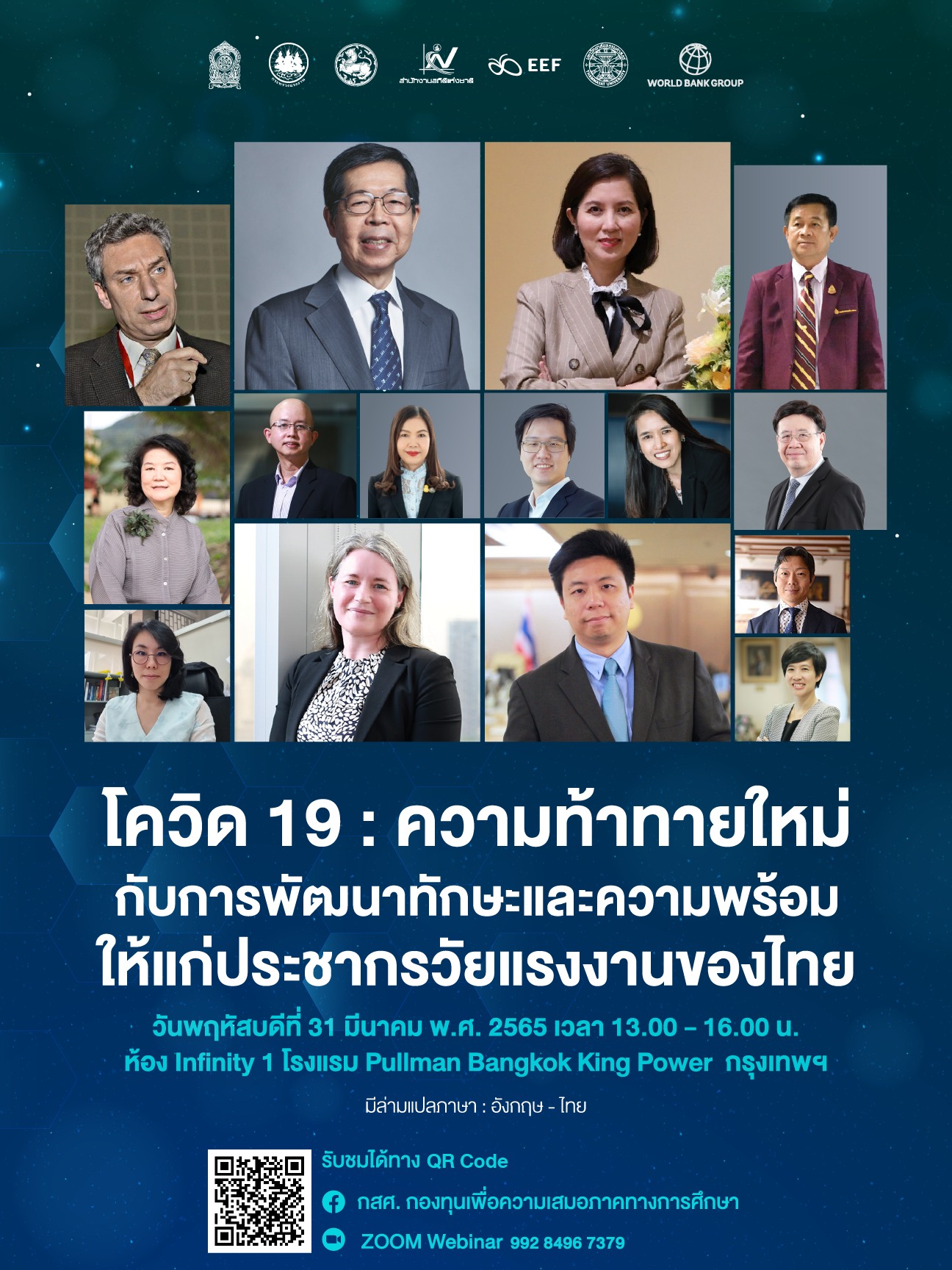Workforce preparation is especially critical now that the COVID-19 pandemic has impacted every country. Lockdown measures and social distancing have had a significant impact on the preparedness of working-age people during the time. After the outbreak has passed, it’s critical to focus on finding solutions to repair the harm done to the labor market.
The Equitable Education Fund (EEF) organized a discussion forum titled “COVID-19: New Challenges in Skill Development and Readiness for Thailand’s Working Age Population” in collaboration with the Ministry of Education, Ministry of Labor, Ministry of Interior, National Statistical Office, Bank of Thailand, and Thammasat University to discuss new challenges that all youth and working people are facing. Due to the spread of COVID-19, there is massive damage to the capabilities and skills of workers.
The purpose of this discussion is to promote knowledge and understanding to cope with change, increase knowledge integration between the education sector and the labor market, and build a network of policy work on educational inequality. This forum aims to expand the results of new measures to find a solution to a shared problem.

Working-age people are lacking in skills and are unprepared.
The pandemic of the COVID-19 virus has exacerbated the problem of worker skill preparedness. Of course, the impact that is occurring may be difficult to quantify. For this reason, the ‘Adult Skills Assessment on Thailand’ research project, led by The Equitable Education Fund (EEF), the World Bank, the National Statistical Office, and Thammasat University, intends to collect data on the level of ready skills of the working-age population in a variety of areas.
Dr. Poomsarun Thongliamnak, Acting Director of the Equitable Education Research Institute (EEFI) at Equitable Education Fund (EEF), said of the study in the project. Currently, 1.3 million young people work in the informal sector, out of a total workforce of around 20 million, with about 65 percent of them being women. They had to drop out of school due to the dilemma of becoming pregnant while still in school. Of course, with such large numbers comes a slew of unskilled labor problems.

A total of 9,000 working-age people aged 15 to 64 from 45 provinces and 6 regions were included in the research. Reading skills, emotional abilities, and social skills were all evaluated. In addition, background information on the respondents is collected, such as their educational level, family status, occupation, and the impact of the COVID-19 circumstance.
This set of data, Dr. Poomsarun said, will be completed by April 2022, which will help formulate policy measures more precisely the problem of the state, especially during the changing labor market situation around the world after the outbreak. This point is consistent with a presentation by Dr. Prasarn Trairatvorakul, Executive Chairman of the Equitable Education Fund (EEF), who stated that work skills are the key to successful careers. It may be more important than or equal to having an educational qualification in the modern era.
Dr. Prasarn Trairatvorakul Nattasit Rakkiatwong
Dr. Prasarn cited a World Economic Forum 2019 survey that showed technology will have a significant impact on 1.1 billion employment. Thailand has just 14% of highly skilled professionals among the 141 nations surveyed. 70% of Thai workers have only received an elementary education. Therefore, the issue of strengthening preparation to join the job market following COVID-19 requires immediate attention.
Efforts to bring data from the study program to further policy-driven workers away from the skill barrier come from senior economist Nattasit Rakkiatwong at the Thailand Development Research Institute (TDRI). He has also stated that Thailand has plans to develop many sectors, including the Ministry of Labor or the Ministry of Education, such as digital technology or high-tech financial timeliness. However, it’s a crucial turning point to decide whether the policy will be successful or not. Nattasit said it was at the level of basic skills development that Thailand had to identify and find a solution to the disparity of the fundamental skills gap that arose after the COVID-19 pandemic.
Fundamental skills appear to be at the heart of an incredibly potent prelude to working-age people’s growth. How powerful and necessary are these primary skills? A representative from the World Bank will provide further explanations.
Fundamentalskillsare necessary for a successful profession.
In developing fundamental skills, Toby Linden, Education Manager at the World Bank, said that basic skills are essential to laying the foundations for future careers as Thailand strives to move towards the ‘Thailand 4.0’ era. The requirement for creative and imaginative labor in order to become a “Smart Thailand,” as well as the abilities required to get there, must return to the fundamental skills of working age.
Toby Linden Sompop Manarungsan
Basic skills preparation is required not just in Thailand but also across the world. He gave an example of a survey by the Organization for Economic Co-operation and Development (OECD). In a 2015 poll, 92 percent of entrepreneurs surveyed agreed that problem-solving and communication abilities were more crucial than or comparable to technical expertise. Meanwhile, the Canadian survey also found empirical evidence that the 25-year-old worker’s salary rises in tandem with their level of fundamental skills, affecting their well-being in several ways.
The lack of basic skills is a big problem. Linden stated that a survey of the ability to read and understand common texts of 10-year-olds in East Asia found that some children of that age in Thailand are unable to read or understand simple writings. There were 23.46 percent of the total number of people. After the Philippines, Cambodia, and Indonesia, it is recognized as the fourth most problematic country. Moving on to the problem of 15-year-olds discovered that 59.5 percent and 52.7 percent of Thai youngsters are not competent in reading text and calculating general math, respectively. It was also ranked the fourth in terms of the most common difficulties.
According to Linden, building fundamental skills can be very effective during childhood: 10 years and even 15 years or less, although the basic skill-building process should be continued throughout life, including communication skills, reading, or math problem-solving. We cannot deny that working people who have developed basic skills since childhood are more adaptable than those who have just started to build skills after childhood.
The COVID-19 outbreak in Thailand has also highly impacted the development of basic skills or preparation for these skills. He gave an example from Thailand’s unemployment data from 2019-to 2021, which showed that youth were significantly more likely to lose their jobs than adults during the COVID-19 pandemic. In addition, the rate of learning losses compared to the school year showed that most students received no additional learning during the COVID-19 pandemic. Thailand has the most significant problems 5th after Cambodia, Philippines, Indonesia, and Myanmar.
Therefore, all parties must work together to restore the potential readiness to enter the labor market of Thai youths. There must be both immediate measures such as school safety and long-term measures such as finding ways to reduce the number of children out of the education system. We should be ready to cope with the learning losses from the COVID-19 crisis and the strengthening of distance learning systems throughout the pandemic.
However, there are still some problems with the education model of the distance learning system. Dr. Sompop Manarungsan, Director of the National Education Reform Committee, stated that Thailand is currently facing three problems: 1) the availability of educational equipment both on the side of the teaching institute and the user; 2) programming problems that may not be conducive to the current remote education system; and 3) human problems, for example, teachers are unable to adapt to teaching in empty classrooms to record instructional clips.
Of course, the problem of rehabilitation for occupations in many disciplines remains unclear. For example, the field requires the use of scientific equipment or areas directly related to vocational training.
Survey and review data to build policy processes.
The basic skills problem-solving process is insufficient for the modern world of work, exacerbated by the COVID-19 pandemic. Causing the channel to solve problems through policy measures needs to start to talk again, especially the use of information more than previously
According to Natthasit of TDRI, the topic of education in Thailand has just lately become more prominent. The findings of a complete research on such concerns might take 5-10 years. It is currently impossible to tell whether policies are beneficial, while some may be effective in trial programs. The next important point is that those projects have not been expanded as much as they should be.
Nada Wasi Pattaraporn Laowong
However, according to research director Nada Wasi, data is being used more and more in practice nowadays. Data is frequently utilized as input into the policy-making process rather than other types of usage, according to the Puey Ungphakorn Institute for Economic Research (PIER), Bank of Thailand.
A prime example of how information can be used in this way is the study of how foreign countries work to adopt policy ideas. It is a policy response with information, making it easier for Thailand to identify policy goals. However, in other nations, the information will be used as an assessment of the policies that go out rather than how effective they are. It will be a significant distinction from Thailand’s idea, as the Thai government concentrates solely on gathering data for policy evaluation through participant questionnaires.
Therefore, if this research project explores the readiness of the working age population, applying the data to policy design can be very helpful in identifying more broad goals. Pattaraporn Laowong, an expert on social development investment at the Office of the National Economic and Social Development Council, stated that such a large-scale survey of the skills of working people has never happened before. In addition to being able to extend this set of data, it may also be used to examine the government’s policies in the past if it is collected. For example, tracing back to what sort of education system employees with excellent and terrible basic skills received; or how government policies from both the Ministry of Labor and the Ministry of Education have responded to workers’ skill growth throughout the decades.













